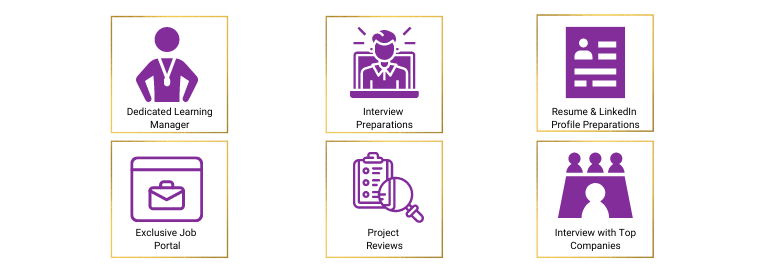Machine Learning with Python Online Training
Mentors Pool Machine Learning Certification Training using Python will help you gain expertise in various machine learning algorithms such as regression, clustering, decision trees, random forest, Naïve Bayes, and Q-Learning. This Machine Learning Training will also help you understand the concepts of Statistics, Time Series, and different classes of machine learning algorithms like supervised, unsupervised and reinforcement algorithms. Throughout the Python Machine Learning Training, you’ll be solving real-life case studies on Media, Healthcare, Social Media, Aviation, HR.
In collaboration with
Online Class
Projects
Hands-On
n/a

30 Hrs Instructor-led Training
Mock Interview Session
Project Work & Exercises
Flexible Schedule
24 x 7 Lifetime Support & Access
Certification and Job Assistance



Course Benefits




Machine Learning with Python Certification Online Training Course Overview
1-Python for Machine Learning
Learn about the various libraries offered by Python to manipulate, preprocess, and visualize data.
2-Fundamentals of Machine Learning
Learn about Supervised and Unsupervised Machine Learning.
3-Optimization Techniques
Learn to use optimization techniques to find the minimum error in your Machine Learning model.
4-Supervised Learning
Learn about Linear and Logistic Regression, KNN Classification and Bayesian Classifiers.
5-Unsupervised Learning
Study K-means Clustering and Hierarchical Clustering.
6-Ensemble techniques
Learn to use multiple learning algorithms to obtain better predictive performance .
7-Neural Networks
Understand Neural Network and apply them to classify image and perform sentiment analysis.
- Anyone interested in Machine Learning and using it to solve
- Software or data engineers interested in quantitative analysis with Python
- Data analysts, economists or researchers
The pre-requisites for the Python and Machine Learning training course include development experience with Python. Fundamentals of Data Analysis practiced over any of the data analysis tools like SAS/R will be a plus. However, Python would be more advantageous. You will be provided with complimentary “Python Statistics for Data Science Course” as a self-paced course once you enroll for the Machine Learning online course.
Mentors Pool follows a rigorous certification process. To become a certified Machine Learning with Python , you must fulfill the following criteria:
- Online Instructor-led Course:
- Successful completion of all projects, which will be evaluated by trainers
- Scoring a minimum of 60 percent in the Machine Learning with Python quiz conducted by Mentors Pool
Data Science has bagged the top spot in LinkedIn’s Emerging Jobs Report for the last three years. Thousands of companies need team members who can transform data sets into strategic forecasts. Acquire in-demand machine learning and Python skills and meet that need.
Machine Learning and AI have taken the centre-stage as more and more brands realise the possibilities of these tools in the post-COVID world. The demand for data engineers was up 50% and the demand for data scientists was up 32% in 2020 compared to the prior year. The average salary for a data scientist in the U.S. is $122,338 per year and according to the Bureau of Labor Statistics, the demand for data scientists is pegged to grow by 16% between 2020 and 2028, a rate that’s faster than the average for all occupations.
Capitalize on the demand for the ‘hottest job of the 21st century’ with a program primed for industry relevance.
Talk to Us
IN: +91-8197658094
Data Scientist has been named the best job in America for 2018 with a median base salary of $242,000 and 4,524 job openings – Forbes, Roles like Chief Data Scientist & Chief Analytics Officers have emerged to ensure that analytical insights drive business strategies – Forbes, Businesses Will Need One Million Data Scientists by 2020 – Kdnuggets
Fees
Online Classroom
- 30 Hrs of Instructor-led Training
- 1:1 Doubt Resolution Sessions
- Attend as many batches for Lifetime
- Flexible Schedule
Batches
Dates
Days
Timings
Enrolment validity: Lifetime
Login
EMI Option Available with different credit cards
Cart
Corporate Training
- Customised Learning
- Enterprise grade learning management system (LMS)
- 24x7 Support
- Enterprise grade reporting
Course Content
Machine Learning with Python Certification Online Training Course Content
Learning Objectives: Basic Python libraries and functions will be taught to you along with the fundamentals of Linux operating system.
Learning Objectives: Here you will learn Git and Version Control
Topics:
- What is Version Control?
- Types of Version Control System
- Introduction to SVN
- Introduction to Git
- Git Lifecycle
- Common Git commands
- Working with branches in Git
- Merging branches
- Resolving merge conflicts
- Git workflow
Learning Objectives: Here you will learn Python with Data science
Topics:
- Introduction to Data Science using Python
- Python basic constructs
- Maths for DS-Statistics & Probability
- OOPs in Python (Self paced)
- NumPy for mathematical computing
- SciPy for scientific computing
- Data manipulation
- Data visualization with Matplotlib
- Machine Learning using Python
- Supervised learning
- Unsupervised Learning
- Python integration with Spark (Self paced)
- Dimensionality Reduction
- Time Series Forecasting
Topics:
- Central tendency
- Variability
- Hypothesis testing
- Anova
- Correlation
- Regression
- Probability definitions and notation
- Joint probabilities
- The sum rule, conditional probability, and the product rule
- Bayes theorem
Topics:
- Machine Learning using Python
- Supervised learning
- Unsupervised learning
- Dimensionality reduction
- Time-series forecasting
Topics:
- Introduction to Big Data and Apache Spark
- Apache Spark framework and RDDs
- PySpark SQL and Data Frames
- Introduction to Hive
Topics:
- Introduction to Deep Learning and Neural Networks
- Multi-layered Neural Networks
- Artificial Neural Networks and various methods
- Deep Learning libraries
Topics:
- Why and when we need MLOps
- AI pipelines
- Training, tuning, and serving on AI platform
- Kubeflow pipelines on AI platform
- CI/CD for Kubeflow pipelines
Topics:
- Introduction to data visualization
- Architecture of Tableau
- Working with metadata and data blending
- Creation of sets
- Working with filters
- Organizing data and visual analytics
- Working with mapping
- Working with calculations and expressions
- Working with parameters
- Charts and graphs
- Dashboards and stories
- Tableau Prep
- Integration of Tableau with R and Hadoop
Learning Objectives: In the Data Science Capstone project, you will use all the knowledge and skills you have acquired throughout this advanced certification program and gain industry experience in the domain.
Course Projects
Analyzing the Trends of COVID-19 with Python
You will be equipped with understanding Pandas or functions such as accumulation of data from multiple data files, Ploty to create interactive visualiztion and more. The technologies will be combined to visualize the prediction.
Customer Churn Classification
You will be familiarized with machine learning algorithms in this project. You will manipulate data to obtain insights, visualize data to figure out trends and pattern, implementation of algorithm like regression etc.
Creating a Recommendation System for Movies
You will work towards creating a recommendation system for movies. You will work with various aspects such as rating prediction, item prediction, matrix factorization, collaboration filtering and many more of similar nature.
Course Certification
Mentors Pool Machine Learning with Python workshop is focused on helping professionals gain industry-relevant Machine Learning expertise. The curriculum has been designed to help professionals land lucrative jobs across industries. At the end of the course, you will be able to:
- Build Python programs: distribution, user-defined functions, importing datasets and more
- Manipulate and analyse data using Pandas library
- Visualize data with Python libraries: Matplotlib, Seaborn, and ggplot
- Build data distribution models: variance, standard deviation, interquartile range
- Calculate conditional probability via Hypothesis Testing
- Perform analysis of variance (ANOVA)
- Build linear regression models, evaluate model parameters, and measure performance metrics
- Use Dimensionality Reduction
- Build Logistic Regression models, evaluate model parameters, and measure performance metrics
- Perform K-means Clustering and Hierarchical Clustering
- Build KNN algorithm models to find the optimum value of K
- Build Decision Tree models for both regression and classification problems
- Use ensemble techniques like averaging, weighted averaging, max voting
- Use techniques of bootstrap sampling, bagging and boosting
- Build Random Forest models
- Find optimum number of components/factors using scree plot, one-eigenvalue criterion
- Perform PCA/Factor Analysis
- Build Apriori algorithms with key metrics like Support, Confidence and Lift
- Build recommendation engines using UBCF and IBCF
Yes, Machine Learning certificates are worth it. Here are the reasons why:
- Validates your machine learning skills needed for improving career opportunities
- Improved potential for a better salary
- Expanded knowledge base
On the whole, there are many ML algorithms, all of which are broadly categorized into the following:
- Supervised Learning
- Unsupervised Learning
- Semi-supervised Learning
- Reinforcement Learning
Our aim is to find a way to predict output B when provided with sets of inputs A.
- Supervised Learning – In supervised learning, we know a question and we also know the answer, our aim is to find a way/pattern so that we reach from the question to our desired answer. Human experts provide the computer with inputs (A) and the correct output (B) is also provided. The machine is, therefore, expected to learn the pattern which would lead us from the input to our desired outputs. Below are some of the popular supervised learning algorithms:
- Linear Regression: It aims to find a modeling relationship between independent variables(A) and a dependent variable (B) by using line equation. It is used for predictive analysis.
- Random Forest: Decision trees, by design are vulnerable to high variance. To reduce variance, we limit the rows (features) calculated at each split point of the tree to make them different. It also removes overfitting as compared to decision trees output.
- Unsupervised Learning – Here, we don’t know the value of B but we know A. So our aim becomes to group this collection of unsorted information according to patterns, and similarities in them without any prior training. Most popular unsupervised learning algorithms are:
- K-Means: It aims to find groups in the data provided by working iteratively to assign all the data entries to one of these groups by using features (A) provided. K here defines the number of these groups.
- Semi-supervised Learning – In the above 2 learnings, either all the data is labeled or none of it is. This learning falls in between the two. As in real life labeling of data is expensive, labels for all the data is not possible and only some of it is labeled. For such cases, this learning is best as it exploits the idea that even though the group memberships of the unlabeled data are unknown, this data carries important information about the group parameters. The most popular algorithm which uses this learning is Co-training which is used for text mining in search engines.
- Reinforcement Learning – Rather than randomly trying to find our paths from A to B, we try to guide the machine step by step or state by state by giving a reward each time it does the right thing. Greedy approach is used to take the step (decision) that will yield the best result. To take decisions, it uses 2 approaches –
- Policy learning – It tells the agent exactly what to do at each state.
- Q-Learning / Value Functions – Our algorithm is provided with a framework to make its own decisions rather than we explicitly telling it at each step.
In order to thoroughly understand the concepts of Machine Learning and to develop successful Machine Learning projects, it is important to know the following:
- Programming languages: Being comfortable working with programming languages such as Python, Java, Scala etc is an important prerequisite before you embark upon your Machine Learning journey. A learner of Machine Learning must be able to make use of these programming languages, at least in a basic manner, so as to be able to grasp Machine Learning skills more thoroughly. Knowledge of formatting data, processing the data in order to make it compatible with the machine learning algorithm etc are also skills that will come in handy on your journey to mastering Machine Learning concepts and their application in real life.
- Database skills: A prior knowledge and experience of working with MySQL as well as relational databases is also a prerequisite to fully gauging and understanding Machine Learning concepts. During the course of their Machine Learning journey, learners will have to make use of data sets obtained from various different data sources simultaneously. Programmers must be able to read data available at different sources, and then convert this data obtained in a format that is readable by as well as compatible with the machine learning framework that they are working on at the moment.
- Machine Learning visualization tools: There exist several tools that are available for visualizing the data used in Machine Learning. Basic knowledge and understanding of some of these tools will turn out to be helpful while you are applying the concepts of Machine Learning in real life.
- Knowledge of Machine learning frameworks: Several statistical, as well as mathematical algorithms, are made use of in order to design a Machine Learning model to learn from the input data and come to a prediction for a given data set. Knowledge of one or more of these frameworks including Apache Spark ML, Scala NLP, R, TensorFlow etc. is a prerequisite for a thorough understanding of Machine Learning concepts.
- Mathematical skills: Mathematics is at the heart of Machine Learning. This is because it is through these mathematical algorithms and concepts that the data is processed, analyzed and used in order to form a Machine Learning model. The following is a list of some of the mathematical concepts that a student of Machine learning must know in order to understand and implement the machine learning models and concepts successfully:
-
- Optimization
- Linear algebra
- Calculus of variations
- Probability theory
- Calculus
- Bayesian Modeling
- Fitting of a distribution
- Probability Distributions
- Hypothesis Testing
- Regression and Time Series
- Mathematical statistics
- Statistics and Probability
- Differential equations
- Graph theory
-
The requirement for this online machine learning Python course is a system with Intel i3 processor or above, minimum 8GB RAM and 25 GB HDD Storage, Chrome (latest version) / Mozilla with firebug (latest version), Jupyter Notebook or any Python IDE’s.
We have shortlisted below some of the best Machine Learning courses one can go for.
- Machine Learning A-Z
- Machine Learning, Data Science, and Deep Learning with Python
- Machine Learning with Javascript
- Intro to Machine Learning with PyTorch
- Intro to Machine Learning for Coders
- Advanced Machine learning Specialization
Certification Course Reviews
Certification Course FAQs
Data is transforming everything we do. All organizations, from startups to tech giants to Fortune 500 corporations, are racing to harness the immense amounts of data generated unknowingly every day and put it to use for key decisions. Big and small data is reshaping technology and business as we know it and will continue to do so (in the near future at least).
The state of Machine Learning in companies and in your daily life machine Learning is no more just a mere niche of the tech world but is a new field of work and research altogether. Tech experts have been increasingly making use of Machine Learning over the years. Surge pricing at Uber, Walmart product recommendations, Social media feeds displayed by both Facebook and Instagram, Google Maps, detecting financial fraud at financial institutions etc – all these and many more functionalities are now being performed with the help of powerful Machine Learning algorithms, increasingly without human interference.Every individual is making use of one or the other product of Machine Learning, whether he knows it or not. In such a scenario, learning about Machine Learning is an inevitable step that any professional, especially someone involved in the field of Information Technology and Data Science, must take in order to not become irrelevant.
Some of the benefits of learning Machine Learning include the following:
- It reels in better job opportunities: According to a report published by Tractica, services driven by Artificial Intelligence were worth $1.9 billion in the year 2016 and this number is expected to rise to the neighbourhood of around $19.9 billion by the end of the year 2025. Machine Learning is the bandwagon that every corporation in the world is hitching its wagon to. With each industry in the world looking at expansion in the domain of Machine Learning and Artificial Intelligence, a knowledge of the same is bound to attract more and brighter career opportunities in the present scenario and in the future as well.
- Machine Learning engineers earn a pretty penny: The valuation of a Machine Learning expert can be compared to that of a top NFL quarterback prospect. According to a study published by SimplyHired.com, the average income of a machine learning engineer is pegged at $142,000, whereas an experienced machine learning engineer can earn up to $195,752 per year.
- Demand for Machine Learning skills is only increasing: There exists a huge gap between the demand and the availability of Machine Learning engineers. This skill gap is increasingly being lamented by the Chief Information Officers (CIOs) of some of the biggest corporations around the world. What this means, essentially, is that the demand as well as the pay for professionals with Machine Learning skills is only going to increase in the future.
- Most of the industries are shifting to Machine Learning: Most industries in operation around the world are dealing with a humongous amount of data that is only increasing every single day. The benefits reaped by a thorough analysis of this data is a fact that companies are fast taking cognizance of By gleaning insights from this data, companies are looking to work more efficiently and competently, as well as gaining an edge over their competitors.
At such as time, all industries from the financial services sector to government agencies, the healthcare industry and oil and gas mega-corporations to the transportation sector – every industry is a ripe field for work in the field of Machine learning.
Machine learning is a huge field which is expanding day by day due to its diverse and open culture. However, we can assure you that self- learning ML will be effective as long as you are motivated and keep these points in mind
- You will learn practical skills faster and learn to implement them through hands-on learning more easily than by going through research papers and textbooks or learning to derive proofs. In the real world, you will never actually be required to derive a proof but will be asked to understand and make the best use of available data.
- You will be building your profile as an ML enthusiast along the way as you keep building on projects. Projects are the best way to attract employers and when we self start, the best way to test our skills is to simply implement them through a project.
Below are the steps you can follow:
- Structural Plan: At the outset, you need to create a structured plan on the topics that you must familiarize yourself with first and what can be learnt later.
- Prerequisite: Pick a programming language you are comfortable with and start polishing your mathematical and statistical skills as ML involves dealing with statistical data.
- Learning: Start learning according to the plan created in step (1). Refer to various reliable sources online or from books. Understanding the workflow of ML algorithms is a must.
- Implementation: We can never truly learn unless we learn how to implement our skills. Try to build projects which use the algorithms you learned. Take datasets from the internet and start solving problems, and take part in online competitions such as Kaggle to learn more.What is most important is that you keep on tackling ML problems on a regular basis so as to polish your skills and incorporate out of the box thinking in an otherwise simple solution.
Yes, Machine Learning does require some coding skills. This ML using Python course will cover OOPs concepts, data structure, and algorithms. Machine Learning uses Python, C++ and Java as the most popular programming languages.
No doubt! Machine Learning is in high demand, and at the same time, employers need professionals who have the right skills for building applications for the future.
Here, at Intellipaat, we have created our program by acknowledging the fact that our learners come from varied backgrounds. So, we curate it from the basic level and gradually increase the difficulty level for them to easily grasp all the concepts taught as part of the program. Further, we make sure that, by the end of the program, the learners’ skills would be equivalent to 6-month experience in this technology.
Some of the top job roles in the field of Machine Learning are
- Data Scientist
- Machine Learning Engineer
- NLP Scientist
- Computer Vision Engineer
- Data Architect
Mentors Pool best Machine Learning course gives you all the necessary skills to become eligible for such roles.
Machine learning is a popular and fast-growing career in computer science. It is constantly evolving and growing and you can apply it to many industries, including shipping and fulfillment, as well as medical sciences. Machine learning engineers create artificial intelligence to better recognize patterns and solve problems. It is a highly sought-after career option, but it can be very competitive. Machine learning engineers who are interested in becoming certified can distinguish themselves from their competition by attending boot camps, submissions of code repositories and hands-on experience.






